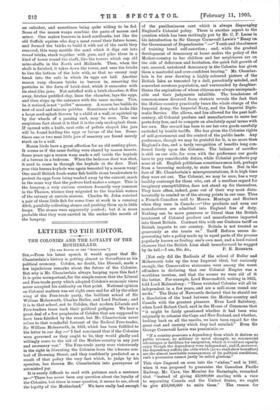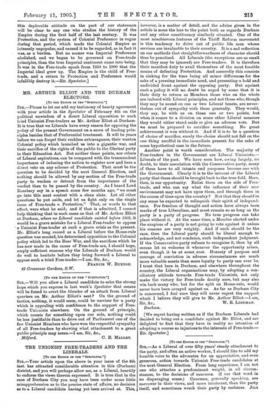THE COLONIES AND THE LOYALTY OF THE MOTHERLAND.
[To THE EDITOR 01 THE " SPECTATOR."]
SIR,—From his latest speech it would appear that Mr. Chamberlain's history is getting almost as threadbare as his political economy. Cobden, no doubt, like Disraeli, made a few injudicious remarks about the future of the Colonies. But why is Mr. Chamberlain always harping upon this fact ? It is quite unimportant, for the simple reason that the Liberal and Free-trade party which adopted Cobden's economic views never accepted his authority on that point. National opinion on Colonial matters was set right once and for all by the other wing of the Free-trade party, the brilliant school of Sir William Molesworth, Charles Buller, and Lord Durham; and it is to that school, not to Cobden, that modern Liberals and Free-traders trace back their political pedigree. We hear a great deal of a few prophecies of Cobden that are supposed to have been falsified by the event, but Mr. Chamberlain never refers to that wonderful forecast of the Radical Free-trader•, Sir• William Molesworth, in 1851, which has been fulfilled to the letter in our day :—" I feel convinced that if the Colonies were governed as they ought to be, they would gladly and willingly come to the aid of the Mother-country in any just and necessary war•." The Fr•ee•trade party were victoriously in the right in liberating the Colonies from the irksome con- trol of Downing Street, and they confidently predicted as a result of that policy the very fact which, to judge by his speeches, has thrown Mr. Chamberlain into paroxysms of astonished joy.
It is surely difficult to read with patience such a sentence as—" There has never been any question about the loyalty of the Colonies, but there is some question, it seems to me, about the loyalty of the Motherland." We have really had enough of the pusillanimous cant which is always disparaging England's Colonial policy. There is another aspect to the question which has been strikingly put by Mr. C. P. Lucas in his introduction to Sir George Cornewall Lewis's " Essay on the Government of Dependencies ":—" Youth and the absence of training breed self-assertion ; and, while the gradual development of democracy at home makes the policy of the Mother-country to her children and her neighbours err on the side of deference and hesitation, the quick full growth of raw, assured, untutored democracy in the Colonies has given them a masterful and over-confident bearing." Mr. Chamber- lain is for ever drawing a highly coloured picture of the British Isles as tenanted by a dull, parochially minded, and somewhat covetous population, and surrounded by daughter- States the aspirations of whose citizens are always unimpeach- able and their judgments infallible. The touchstone of common-sense divorced from rhetoric reveals the fact that the Mother-country practically bears the whole charge of the Imperial Army, the Imperial Navy, and the Imperial Diplo- matic Service. She allows, and has allowed for the past half- century, all Colonial produce and manufactures to enter her ports duty free, and to'compete on absolutely equal terms with her own. Her reward has been to see her own goods carefully excluded by hostile tariffs. She has given the Colonies rights of self-government and the control of the public lands. Any preference, though we may be grateful for it, is no more than England's due, and a tardy recognition of benefits long con- ferred freely upon the Colonies. The balance of sacrifice is still on our side, for even with the preference our goods have to pay considerable duties, while Colonial products pay none at all. English politicians sometimes seem loth, perhaps from a becoming modesty, to state these facts. But in the face of Mr. Chamberlain's misrepresentations, it is high time they were set out. The Colonist, we may be sure, has a very healthy contempt for those who, out of a needless regard for imaginary susceptibilities, dare not stand up for themselves.
They have often, indeed, gone out of their way most disin- terestedly to remind us of the strong points in our case. Thus a French-Canadian said to Messrs. Montagu and Herbert when they were in Canada :—" Our products and even our manufactures are admitted into England free of duty.
Nothing can be more generous or• liberal than the British treatment of Colonial produce and manufactures imported into Great Britain. Contrast this with our Customs tariff on British imports to our country. Britain is not treated as generously as she treats us." Tariff Reform seems de- generating into a policy made up in equal parts of the process popularly known as fouling one's own nest, and a loud-voiced clamour that the British Lion shall henceforward be wagged
by its tail.—I am, Sir, &c., P. E. ROBERTS.
[Not only did the Radicals of the school of Buller and Molesworth take up the true Imperial ideal, but curiously enough, the Conservative statesmen were among the worst offenders in declaring that our Colonial Empire was a worthless incubus, and that the sooner we were rid of it the better. For example, Lord Beaconsfield, writing in 1852, told Lord Malmesbury " These wretched Colonies will all be independent in a few years, and are a mill-stone round our necks." The Duke of Newcastle declared that he should see a dissolution of the bond between the Mother•-country and Canada with the greatest pleasure. Even Lord Salisbury, when Lord Robert Cecil, said in the House of Commons that " it might be fairly questioned whether it had been wise originally to colonise the Cape and New Zealand, and whether•, looking back on all the results, we have been repaid for the great cost and anxiety which they bad entailed." Even Sir George Cornewall Lewis was pessimistic :—
"If a country possesses a dependency from which it derives no public revenue, no military or naval strength, no commercial advantages or facilities for emigration, which it would not equally enjoy though the dependency were independent; and if, moreover, the dependency suffers the evils which (as we shall show hereafter) are the almost inevitable consequences of its political conditions, such a possession cannot justly be called glorious."
This view lingered on even into the " sixties," and in 1867, when it was proposed to guarantee the Canadian Pacific Railway, Mr. Cave, the Member for Barnstaple, remarked that " instead of giving £3,000,000 sterling with a view to separating Canada and the United States, we ought to give £10,000,000 to unite them." The reason for this deplorable attitude on the part of our statesmen will be clear to any one who studies the history of the Empire during the first half of the last century. It was Protection, and the system of Colonial Preference in vogue during that period, which made the Colonial Empire so intensely unpopular, and caused it to be regarded, as in fact it was, as a burden. But no sooner was Imperial Preference abolished, and we began to be governed on Free-trade principles, than the true Imperial sentiment came into being. It was in the Free-trade epoch from 1850 to 1900 that the Imperial ideal grew up. The Empire is the child of Free- trade, and a return to Protection and Preference would infallibly destroy it.—En. Spectator.]







































 Previous page
Previous page